10 Fascinating Facts About Zora Neale Hurston
By Larrisa Pope | On March 8, 2019 | Updated January 8, 2025 | Comments (15)
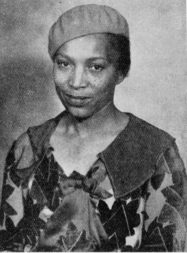
Zora Neale Hurston (January 7, 1891 – January 28, 1960), was a novelist, ethnographer, memoirist, and folklorist whose literary career got off the ground at the height of the Harlem Renaissance era. Presented here are fascinating facts about Zora Neale Hurston that shed light on her complicated life and legacy.
Zora was a natural storyteller. As she grew up, in Eatonville, Florida, she listened to the stories of people she encountered. Her love of story would lead her not only to create her own, but to collect stories from the oral traditions of the African American South and the Black cultures of the Caribbean.
With her determined intelligence and boisterous personality, Zora quickly became a big name in the Harlem Renaissance, or as it was then often called, the New Negro movement of the 1920s. She burst on the literary scene in 1925 after entering Opportunity magazine’s literary contest, for which she was recognized for a short story, “Spunk,” and a play, “Color Struck.”
Zora grew up in America’s first intentional Black community
Eatonville, Florida was the first planned Black community in the United States. Zora described it as “a city of five lakes, three croquet courts, three hundred brown skins, three hundred good swimmers, plenty guavas, two schools, and no jailhouse.”
The community was established in 1887, and became a pardigm of Black excellence and self-governance. Zora’s father served as mayor of the small community. With all of the Black pride and accomplishment around her, Zora felt she was destined for greatness.
She was 10 years older than she claimed to be
Zora lied about her age in order to go back and finish high school. Claiming to be sixteen, she did so in order to qualify for free public education. It worked, and she was able to earn a high school degree. She would never correct the change in age, continuing to present herself as ten years younger than her actual age for the rest of her life.
She was the first Black student at Barnard College
Zora was the first Black student at Barnard College, the women’s college connected with Columbia. There, starting in 1925, she studied with the noted anthropologist Franz Boas, who recognized her talent for storytelling. He encouraged her to pursue her abiding interest in Black cultures of the American South and Caribbean. She was 37 when she graduated in 1928 with a B.A. in anthropology.
Zora’s writing and anthropological pursuits became intertwined as Boas urged her to deepen her research, something that she loved doing.
. . . . . . . . . .
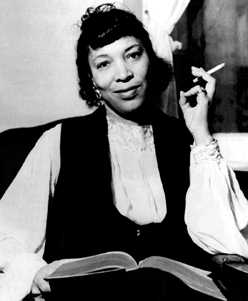
Zora Neale Hurston Interview (1934)
. . . . . . . . . .
Zora worked as Fannie Hurst’s assistant
Zora worked as an assistant to one of the most successful writers of the era, Fannie Hurst. The two met at Opportunity‘s literary awards event in 1925. Hurst was white, Jewish, and hugely successful. Despite the ostensible power imbalance, the two had a friendship that lasted the duration of their life.
Both Fannie and Zora wrote about their marginalized identities and oppression as underlying themes in their stories. Ironically, though Fannie Hurst was one of the era’s most famous and well-paid writers, today her work is largely forgotten, while Zora’s is revered. Read more about the friendship of these two literary women.
Zora received a Guggenheim to study voodoo rituals
In 1936 Zora was awarded the prestigious Guggenheim fellowship, with which she researched voodoo rituals in Jamaica and Haiti. During her stay on these islands, she conceived what would be her most famous work: Their Eyes Were Watching God. Although the novel was criticized by her Black male colleagues when first published, it later became a highly acclaimed work of fiction.
. . . . . . . . . .
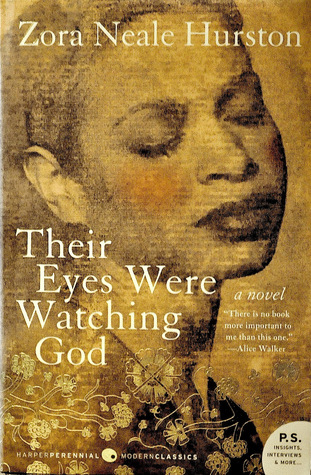
Quotes from Their Eyes Were Watching God
. . . . . . . . . .
She made very little money from her writing
Zora was always compelled to work and held several odd jobs from an early age. Among them she worked as a waitress in a nightclub, as a manicurist in a Black-owned barbershop that served only whites, and as a domestic.
Even as she became established her richly productive dual career as a writer (producing novels, short stories, plays, and essays) and ethnographer, she was constantly beset by financial challenges.
Zora lived in the edge of poverty for most of her life. This forced her to work at other jobs that distracted from her true passion. The largest royalty payment she had ever earned from her literary works was $943. Famously, her later years were marred by utter financial ruin.
. . . . . . . . . .

. . . . . . . . . .
She was controversial within the Black literary community
Zora used Black southern vernacular in several of her literary works. For this she received a lot of criticism by the Black literary community. Some literary critics and fellow writers felt her work was a form of entertainment for white audiences.
Author Richard Wright was among her most vocal detractors; he referred to Zora’s style as a “minstrel technique” designed to appeal to a white readership. Literary history has, of course, vindicated Zora Neale Hurston.
. . . . . . . . . .
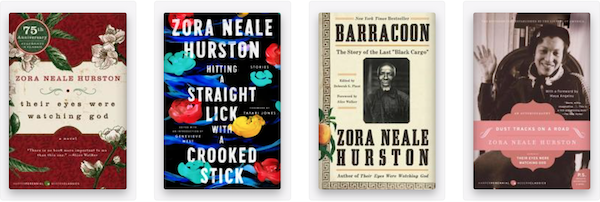
Zora Neale Hurston books on Bookshop.org*
Zora Neale Hurston page on Amazon*
. . . . . . . . . .
She was married three times
Zora was married three times, but none of her marriages lasted more than a couple years. In 1927, her first marriage was to Herbert Sheen. He was a jazz musician and former instructor at Howard University.
Her next, and shortest, marriage was to Albert Price, who she met in 1939 while working for the WPA in Florida. Their marriage lasted a mere seven months, though they didn’t divorce until 1943. She married again the following year to James Howell Pitts of Cleveland. This marriage, much like the one before, lasted less than a year.
. . . . . . . . . .
Zora feuded with Langston Hughes
Zora and Langston Hughes were opposing personalities. She was the boisterous ethnologist, novelist, and playwright with a style reflecting her Southern roots. He was an urbane poet. But they shared the same literary mission: to capture the complexity of the American Black experience. With this commonality, they became fast friends.
The two were never romantically involved (Hughes was gay), but they shared a powerful emotional bond that Zora guarded fiercely. The feud started when Hughes and Hurston came up with the idea of collaborating on a folk play, Mule Bone, which was to meld their talents.
They worked on the play together and apart. Zora came to think of it as her play, and Hughes as his. They each had their versions of the play copyrighted and both sought legal recourse for infringement. It was a messy dispute that led to a creative standstill, and it ended their close relationship.
The play would not be staged until 1991, long after both writers had passed away.
. . . . . . . . . .
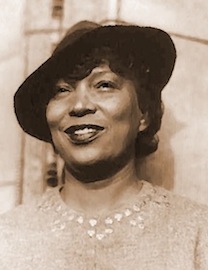
Zora on Books, Publishing, & Publishers
. . . . . . . . . .
Zora’s grave remained unmarked for over a decade
Dying in abject poverty, there was no money to afford a headstone when she passed away in 1960. As a result, her grave remained unmarked for many years.
In 1973 Alice Walker, then a young author inspired by Zora, traveled to her burial site and marked it with a proper headstone. She believed that Zora was deserved to be rediscovered, and inscribed the headstone with “Genius of the South.”
Walker would go on to publish an essay In Search of Zora Neale Hurston, which helped introduce Zora’s body of work to new generations of readers. Publishers have print new editions of Zora’s novels and other writings, with sales in the millions. She surely could have used the recognition and the money in her lifetime.
. . . . . . . . .
Larrisa Pope is a 2019 SUNY New Paltz graduate with a degree in International Business and Public Relations. She is passionate about keeping the legacies of iconic female authors alive.
*These are Bookshop Affiliate and Amazon Affiliate links. If a product is purchased by linking through, Literary Ladies Guide receives a modest commission, which helps maintain our site and helps it to continue growing!
Had I known about Zora Neal Hurston as a high school student, I would have majored in Anthropology when I was in college. She was brilliant in her day, and is even more brilliant today.
Thank you for your comment, Charlene. She surely was uniquely multi-talented, and it’s fortunate that she was rediscovered.
Thank you for enlightening me about Zora Neale Hurston. It has inspired me to begin reading some of her writings!
She’s a fantastic writer, Marcia; I hope you’ll enjoy discovering her work!
I love her work, thanks for the article
You’re very welcome, Lorie.
I once had a book called voices of the Harlem Renaissance and there was a story in that book that she wrote called Spunk. And if you ever get to read it, you will see similarities in The Color Purple written by Alice Walker. To me she was a brilliant writer because she spoke as the people she wrote about.
Cynthia, belated thanks for your comment. Spunk is a wonderful short story and Voices of the Harlem Renaissance is a valuable anthology. I agree that Zora must have been an influence on Alice Walker, who I believe isn’t nearly as talented as Zora. Alice did do one really incredible thing, which was to nearly singlehandedly rescue Zora from literary oblivion (story here: https://www.literaryladiesguide.com/literary-musings/how-alice-walker-rediscovered-zora-neale-hurston/)
is she still living today
Zora died in 1960. Her dates were 1891–1960.
AMAZING !!!!!!!!!!!!!!!!!!!!!!
Thank you for writing about Miss Zora Neal Hurston. What about her long standing “fight” after falling out with poet Langston Hughes and a yet unpublished manuscript? This was news to me..a fascinating story.
Thanks, Brenda — those are great ideas, and we’ll try to add them soon!
hi. these really helped me with the project i had to do.
I’m glad to hear that, Nora! Zora was amazing, and I’m glad she has been rediscovered.